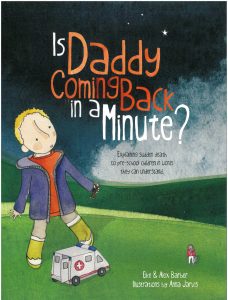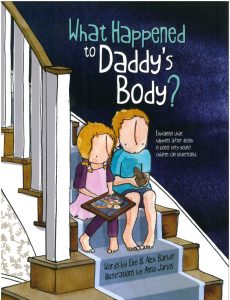By Elke Barber, young widow and author of ‘Is Daddy Coming Back in a Minute?’ and ‘What Happened to Daddy’s Body?’ offers her thoughts on the mind of a grieving child, and how best to reach them.
 What picture pops into your head when you hear the word ‘death’?
What picture pops into your head when you hear the word ‘death’?
Chances are, a pretty uncomfortable one. But crucially, one that you understand. You understand immediately what death means, and all the sadness, grief and emotion that is associated with it.
Do you know what a three-year old thinks of when he hears the word ‘death’?
Nothing. Because, chances are, he has never heard of it before. He doesn’t know what it means! He doesn’t even know that such a thing exists…
In April 2009, I was faced with having to explain to my three-year old just that: death. My husband had suffered a totally unexpected fatal heart attack; no family history, no previous symptoms, aged only 34. And our son Alex was the only person with him at the time. He managed to raise the alarm and get an ambulance there, but sadly Martin died at the scene. All of a sudden I found myself a young widow and a single Mum to two grieving children: Alex, aged three, and Olivia, aged only 11 months…
“He’s still so young – he won’t remember.”, and “He won’t understand.” were the well-meaning phrases I heard most often at the time. But I quickly learnt that these preconceptions couldn’t be further from the truth. I remember Alex lying in bed one night, not too long after his daddy’s death, and innocently asking “How many more sleeps until Christmas?” – I tried to work it out in my head, only for him to follow this with “And how many more sleeps until I have to die Mummy?” – I was completely taken aback…
Over the years I have learnt many things about child grief; especially that of very young children. How they grieve in little pockets here and there, and how their understanding changes over the years. At this young age they have no concept of ‘forever’, and still think that death is reversible. You know magical thinking? When you blow out your birthday candles and make a wish? A bereaved child will make the same wish every year, and no matter how many times you tell your toddler or pre-school child that THAT wish can NEVER come true, it is not until they are about eight years old that they truly understand what we already know. And then the grieving starts all over again. 
They will ask you questions. Lots of them. And they will ask them again and again. But trust me; they are not trying to annoy you. They are just trying to understand. And it takes them a little while to process. To a three-year old there is no difference between asking “How does an aeroplane stay in the air?”, and “What Happened to Daddy’s body?” – They are simply trying to make sense of it all.
Unfortunately we can’t protect our children from everything, but I strongly believe that it is our job as adults to be by their side and to help them understand. Being honest with them, and answering their questions using age-appropriate language is important. Please remember though that young children think very, very literally… While you might not think twice about words like ‘body’ or ‘headstone’ – because you know what they are – a young child might imagine something quite different if it isn’t explained properly. I remember Alex asking what happened to Daddy’s head, arms and legs if it was only his body in the coffin? He must’ve pictured a torso when I said ‘body’ and had been wondering where the rest of his daddy had gone. Just as well he asked! Or there was this little girl, too frightened to visit her mother’s grave, and for ages her dad couldn’t figure out why. It was only much later that he discovered that when he had explained to her that there would be a headstone at the end of her mum’s grave, she thought it would be her dead mother’s actual head turned to stone! She was so scared!
Please don’t be frightened talk about the deceased – or death! Don’t be frightened to show your own grief. Don’t be scared to cry – it’s okay to cry together. Encourage questions, and answer them honestly. If you don’t know the answer, it’s okay to say “I don’t know, but some people believe this….” Please remember that children will grieve again and again – as they reach new developmental milestones and gain a better understanding of such complex concepts as ‘eternity’ and ‘finality’ for example.
Above all, please remember that it’s okay to be sad, but that it’s okay to be happy too.
If you would like to read more articles like Elke’s and hear the latest news and offers on our books, why not join our mailing list? We can send information by email or post as you prefer. Please also tell us about your areas of interest so we can send the most relevant information. You can unsubscribe at any time.